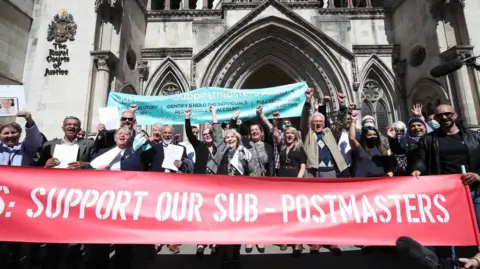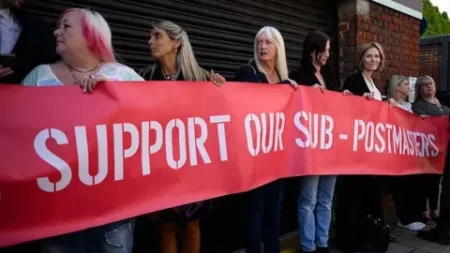The Post Office Horizon IT scandal has deeply affected hundreds of sub-postmasters who were wrongly accused and prosecuted for alleged criminal activities due to discrepancies in their branch accounts. The inquiry led by Sir Wyn Williams recently published its first report, which emphasizes the “disastrous” impact the scandal has had on the victims, detailing the profound suffering experienced by those wrongfully implicated.
The primary findings of Sir Wyn’s report highlight a tragic reality: at least 59 individuals contemplated suicide, with 10 making actual attempts, and troublingly, more than 13 people may have died as a direct result of the distress caused by the scandal. The inquiry illustrates the extent of the human suffering involved, as many victims have faced significant personal ramifications, including divorces, severe mental health issues, and substance abuse problems. The Post Office has issued an “unreserved” apology and has stated its commitment to examining the report and addressing its findings.
As this initial volume of the report focused on personal testimonies and the heartbreaking consequences faced by these victims, it also included discussions on compensation mechanisms, which have proven inadequate. The inquiry’s findings indicate that pensions and life insurance policies have been affected, making access to redress even more complicated. Victims expressed feelings of despair, with one postmistress reportedly stating that she had to enter rehab for an extended period because the pressures from the Post Office had driven her to alcohol as a coping mechanism.
The inquiry released a set of urgent recommendations aimed at rectifying the situation and providing needed support to those affected. These recommendations include offering free legal advice for claimants, establishing compensation payments for the close family members of the victims, and facilitating a program of restorative justice involving affected parties, the Post Office, and Fujitsu, who provided the faulty software that was at the center of the scandal. Sir Wyn’s critical analysis pointed to significant systemic flaws in the compensation process, which is currently hampered by three different schemes. He expressed concern regarding the sluggish pace of compensation delivery, suggesting that the Post Office’s adversarial approach has often obstructed timely resolutions for many claimants.
The report anticipates that the number of individuals seeking compensation will grow, with around 10,000 already engaged in the process. Sir Wyn called for the government to clarify what constitutes “full and fair financial redress” and urged necessary revisions to the existing compensation frameworks. He indicated that in an upcoming report, he would delve deeper into the events leading to this scandal, scrutinizing the responsibilities of those in senior positions at the Post Office and Fujitsu.
The government has acknowledged its obligation to compensate the families of the victims; however, there are stipulations in place that necessitate concrete evidence of distress experienced due to the scandal. Post Office minister Gareth Thomas highlighted the challenges of effectively developing a compensation scheme that addresses these complex issues while ensuring that the needs of affected family members are taken seriously.
A spokesperson from the Post Office recognized the devastation wrought upon the lives of those impacted by the Horizon scandal, declaring it a shameful chapter in their history. This statement echoed a collective commitment to thoroughly review the inquiry’s findings and implement actionable changes to mitigate past grievances.
Moreover, the financial implications of the scandal have also been substantial. Newly disclosed government figures indicate that the legal costs associated with the various compensation schemes have soared to £100 million, with law firm Herbert Smith Freehills reportedly receiving £67 million for its role in the Horizon Shortfall Scheme.
Advocacy from victims continues to play an essential role in driving attention to this scandal. Jo Hamilton, a former sub-postmaster and campaigner, expressed her frustration regarding governmental spending on legal defenses that seem to undermine the compensation they mandated. She emphasized that the report opens the door for more profound investigations into the accountability of those responsible for the suffering inflicted.
In summary, while the inquiry initiates a long-overdue recognition of the pain endured by the victims of the Post Office scandal, it also calls for tangible actions to create reparative measures to address the injustices faced by so many individuals. The forthcoming reports will be critical in fully unraveling the complexities of this significant miscarriage of justice.











